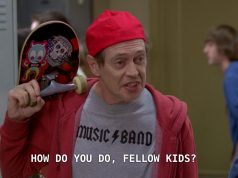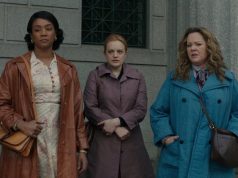The last thing you want is for your movie to stand in the shadow of a better one, and of course it’s jerks like me who are going to point out where the shadow is in the first place. But let’s just say that while “Mobsters and Mormons” is little more than a Mormonized version of “My Blue Heaven,” it holds up pretty well anyway. A movie can be unoriginal and still be funny.
“My Blue Heaven” had Steve Martin as a mobster in Witness Protection hiding out in the suburbs; this time it’s D-lister Mark DeCarlo as the Mafioso, and it’s not just any old suburban wonderland, but Utah, rich with conservatism and packed with Mormons.
DeCarlo plays Carmine “Beans” Pasquale, a New Jersey mobster who must testify against his old cohorts to stay out of prison. To protect him, the Feds send him, his wife Gina (Jeanette Puhich) and their teenage son Vincent (Clayton Taylor) to Utah, where they are now known as George, Linda and Patrick Cheeseman, new arrivals from Nebraska.
Their all-Mormon neighborhood has a busy-body named Louise (Jan Broberg Felt) who spreads gossip and doesn’t think anyone should talk to these new “non-members,” especially considering they do weird things like drink coffee and alcohol and sometimes get the morning paper in their boxers. A few people are on her side, and the film does a nice job indicting such aloof Mormons (conclaves of which exist in Utah, sadly). Luckily, Michael Jaymes (Scott Christopher), first counselor in the local bishopric, is more Christian about it. He and his wife Kate (Britani Bateman) invite the Cheesemans over for dinner and make an effort to help them feel welcome.
Carmine — er, George — isn’t having any of it, at least not at first. He’s sort of a randomly grumpy character, cracking over-written sitcom-style jokes one minute, insulting his wife the next, his moods dictated by the needs of the screenplay. (“Which will seem funnier, life-of-the-party George or cranky George? What’s that? Our cranky joke is funnier than our life-of-the-party joke? OK, then he’s cranky in this scene.”) But gradually he warms to the Jaymeses and to the peculiar local environment, even finding a way to make it work to his advantage. After all, where better for an old shakedown man to find gullible new victims than Utah, where everyone trusts everyone else?
For this project, John E. Moyer split from his usual Mormon-comedy partner Kurt Hale, who directed and co-wrote Moyer’s “The Singles Ward,” “The R.M.” and “The Home Teachers.” Moyer has sole writing credit on “Mobsters and Mormons,” and he directed it, too — which means that for the first time, he gets sole credit or blame for how the film turned out.
It’s certainly better than “Singles Ward” and “Home Teachers,” and maybe better than “The R.M.” These Halestorm-produced films are still plagued by amateurish acting in many, if not most, of the small roles, and it often hurts the comedy: Lines that would have been funny if they’d been delivered right aren’t when they aren’t.
On the other hand, if some of the fish-out-of-water jokes are easy — they’re the first ones that come to mind when you hear “mobster hiding in Utah” — DeCarlo makes them work with his energized performance. He’s as game as any actor I’ve seen in an indie comedy, clearly enjoying himself as he bites into his dialogue and fires it off with gusto and (more importantly) timing. The movie is all about him, and he carries it like a pro.
Some jokes fall flat entirely. I note George’s 2 1/2-minute telling of a bedtime story where the punch line requires the audience to know that “guinea” is a derogatory terms for Italians. (Do people still know that?) There’s also some awkward and unlikely slapstick early on in a sacrament meeting, and I guess the joke about the Catholic churches of Utah being desolate will play better outside the state. (Utahns know that even in Utah, there are plenty of Catholics.)
But other gags succeed and are often laugh-out-loud funny, the main characters are all likable, and the jokes that fail at least aren’t irritating in the endeavor. It’s one of the better Mormon comedies so far — not a huge compliment, I suppose, given the genre’s history, but a sincere one. It even has a very clever “Godfather” reference — clearly a sign that things are looking up.
Note: About 18 months ago, John Moyer asked me to read a draft of this screenplay and offer feedback. I did so, suggesting a few things I thought should be changed or cut. To be perfectly honest, I had no recollection of what those suggestions were, specifically, when I watched the film for this review. After writing it, I found the e-mails between me and Moyer from last year, and was amused to see the suggestions I’d made. Some were incorporated into the film, some were not. In any event, since I didn’t remember what the suggestions were when I reviewed the film, I feel confident in saying that the experience had little or no impact on my opinion of the movie.
B- (1 hr., 37 min.; )





